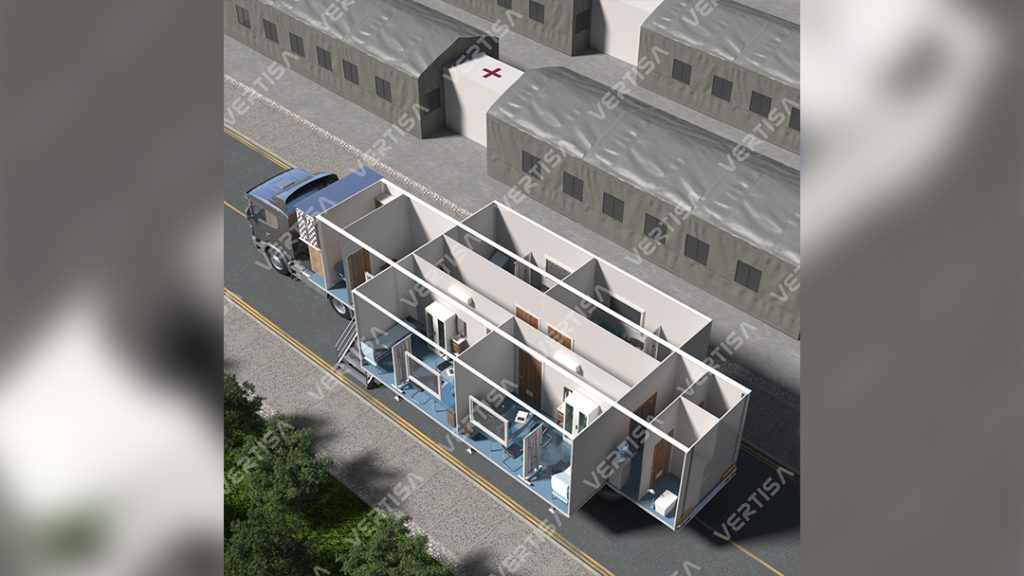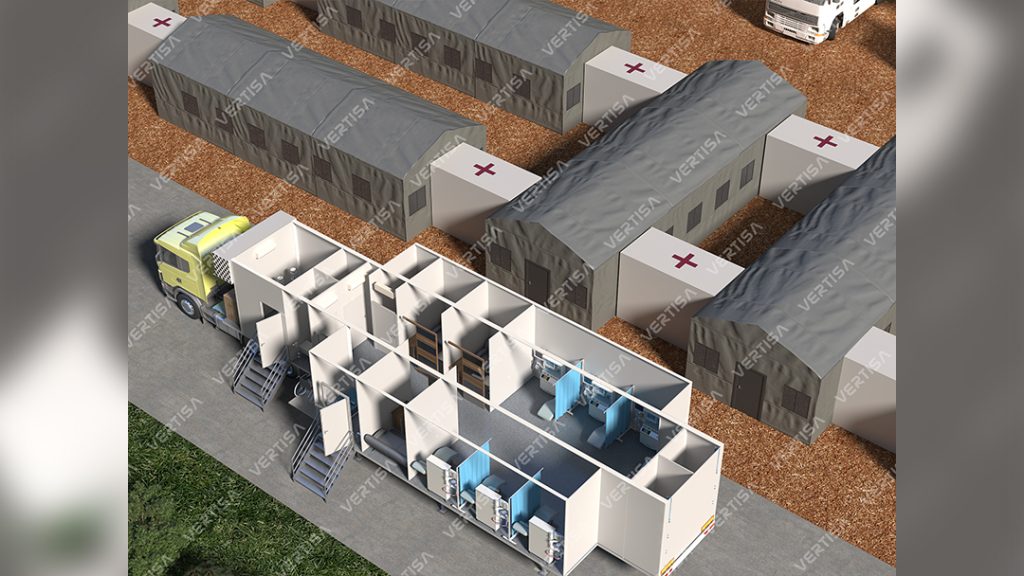Article:
In today’s rapidly evolving healthcare landscape, the concept of a “mobile medical unit” is revolutionizing patient care. This article delves into the multifaceted role of mobile medical units, exploring their benefits, challenges, and potential to enhance medical services worldwide.
Introduction: Empowering Healthcare On-the-Go: The Rise of Mobile Medical Units
In an era marked by technological advancements and a growing emphasis on healthcare accessibility, mobile medical units have emerged as a transformative solution. These versatile units are reshaping the traditional healthcare delivery model by bringing medical services directly to communities in need. From remote villages with limited access to medical facilities to disaster-stricken areas requiring swift intervention, mobile medical units have become a beacon of hope and healing. This article aims to provide a comprehensive overview of the impact of mobile medical units, shedding light on their advantages, the obstacles they face, and their potential to redefine healthcare on a global scale.
Benefits of Mobile Medical Units:
- Access to Remote Communities: Bridging Gaps in Underserved Areas
One of the most significant advantages of mobile medical units is their ability to reach remote and underserved communities. In regions where geographic barriers hinder access to healthcare, these units serve as lifelines. They traverse rugged terrains and navigate challenging conditions to deliver vital medical services, including screenings, vaccinations, and primary care. By eliminating the need for individuals to travel long distances for medical attention, mobile medical units contribute to equitable healthcare distribution and promote the principle that quality care is a right, not a privilege.
2.Rapid Emergency Response: Life-Saving Interventions Wherever Needed
During emergencies, time is of the essence, and swift medical interventions can be the difference between life and death. Mobile medical units are uniquely equipped to provide immediate care in crisis situations. Whether responding to natural disasters, accidents, or disease outbreaks, these units are designed to set up quickly and offer a range of medical services on-site. Their agility and preparedness enable healthcare professionals to address critical conditions promptly and effectively, saving lives and mitigating the impact of emergencies.
3.Cost-Efficiency in Healthcare: Maximizing Resources for Wider Reach
Establishing traditional healthcare facilities comes with significant costs related to construction, maintenance, and staffing. Mobile medical units present a cost-efficient alternative that optimizes available resources. By operating from a mobile platform, these units reduce the need for extensive infrastructure while maintaining the quality of care. This cost-effective approach allows healthcare organizations to allocate funds strategically, expanding their reach and impact. Moreover, mobile medical units can be repurposed to serve different communities, making them versatile and adaptable assets.
Challenges and Solutions:
- Logistical Complexities: Navigating Mobility and Resource Management
Operating a mobile medical unit involves intricate logistical planning. Ensuring a steady supply of medical equipment, pharmaceuticals, and personnel requires meticulous coordination. Additionally, mobile units must adhere to regulatory standards, maintain proper licensing, and comply with health and safety guidelines. Overcoming these challenges necessitates efficient supply chain management, collaboration with regulatory authorities, and a commitment to upholding medical standards on the move.
2.Technological Integration: Seamless Connectivity for Enhanced Patient Care
In the digital age, connectivity is a cornerstone of effective healthcare delivery. Mobile medical units leverage technology for various purposes, such as electronic health records, telemedicine consultations, and communication with central healthcare systems. Ensuring seamless connectivity, especially in remote areas, demands robust technological infrastructure and contingency plans. Advanced telecommunication solutions, satellite connectivity, and portable power sources contribute to uninterrupted communication and data exchange, ultimately enhancing patient care.
3.Community Engagement: Building Trust and Collaboration for Lasting Impact
The success of mobile medical units hinges on community engagement and collaboration. Establishing trust within communities requires cultural sensitivity, effective communication, and a genuine commitment to understanding local needs. Mobile medical units must work closely with community leaders, local organizations, and stakeholders to tailor their services and initiatives to align with community preferences. By involving communities in the planning and implementation of healthcare programs, mobile medical units foster sustainable solutions and lasting impact.
Transforming Healthcare through Mobile Medical Units:
1.Preventive Care Outreach: Promoting Wellness and Disease Prevention
Mobile medical units play a pivotal role in shifting the focus from reactive to proactive healthcare. They offer opportunities for preventive care outreach, including health screenings, vaccinations, and health education workshops. By empowering individuals with knowledge about healthy lifestyles and disease prevention strategies, these units contribute to reducing the burden of preventable illnesses. Preventive care outreach not only enhances individual well-being but also alleviates pressure on healthcare systems by reducing the demand for curative services.
2.Crisis Management and Disaster Relief: Swift Medical Aid in Critical Times
During times of crisis, such as natural disasters or disease outbreaks, mobile medical units are at the forefront of medical relief efforts. Their mobility and readiness enable rapid deployment to affected areas, where they can provide essential medical services and support. Mobile medical units serve as vital components of disaster response plans, ensuring that medical care is available to those who need it most urgently. By delivering immediate assistance and collaborating with other relief organizations, these units contribute to effective crisis management and post-disaster recovery.
3.Education and Empowerment: Spreading Medical Awareness Beyond Borders
Education is a powerful tool for promoting health and well-being. Mobile medical units have the capacity to educate communities about a wide range of health topics, including hygiene practices, nutrition, family planning, and disease prevention. Through interactive workshops, informative materials, and one-on-one counseling, these units empower individuals to make informed decisions about their health. By fostering health literacy and raising awareness, mobile medical units enable communities to take ownership of their well-being and contribute to healthier societies.
Looking ahead, there are several avenues for further enhancing the impact of mobile medical units:
- Continuous Technological Advancements: The rapid pace of technological innovation presents endless possibilities for improving the capabilities of mobile medical units. Integration of advanced medical devices, telehealth solutions, and data analytics can enhance diagnostics, treatment, and patient outcomes. As new technologies emerge, mobile medical units can serve as platforms for testing and implementing cutting-edge medical solutions.
- Collaboration and Knowledge Sharing: Collaboration between mobile medical unit operators, healthcare institutions, governments, and non-governmental organizations can lead to the sharing of best practices, resources, and expertise. Knowledge exchange can foster innovation and streamline operations, ultimately optimizing the impact of mobile medical units on global healthcare.
- Customization for Diverse Populations: Recognizing that healthcare needs vary across different regions and communities, mobile medical units can be customized to cater to specific health challenges. Tailoring services to address prevalent diseases, cultural norms, and socioeconomic factors ensures that mobile medical units provide relevant and effective care.
- Data-Driven Decision-Making: The data collected by mobile medical units can offer valuable insights into public health trends, disease prevalence, and healthcare utilization patterns. By analyzing this data, policymakers and healthcare organizations can make informed decisions about resource allocation, targeted interventions, and long-term healthcare strategies.
- Advocacy for Policy Support: Advocacy efforts are essential to garnering support for the expansion and sustainability of mobile medical unit programs. Advocates can work to raise awareness about the positive impact of these units, engage policymakers, and secure funding to ensure the continued operation and growth of mobile medical initiatives.
In conclusion, mobile medical units represent a remarkable fusion of medical expertise, technology, and compassionate outreach. These units bring healthcare directly to the doorstep of those in need, transcending geographic barriers and championing the cause of healthcare equity. As the world navigates a rapidly changing healthcare landscape, mobile medical units stand as a testament to human innovation and the profound impact that can be achieved when compassion and medical expertise converge.
The journey of mobile medical units is a testament to human resilience and the boundless potential of healthcare innovation. By embracing the principles of accessibility, adaptability, and patient-centered care, mobile medical units illuminate a path towards a healthier and more equitable future for all.



